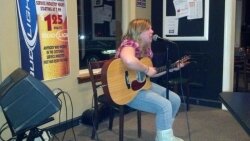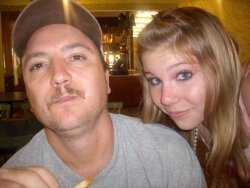Tragedy on the tracks: Mystery surrounds death of Kimberly Welch
-
 Facebook
Facebook -
 "She had a beautiful voice," says Kimberly Welch's mother, Veronica Embrey.Facebook
"She had a beautiful voice," says Kimberly Welch's mother, Veronica Embrey.Facebook -
 Heading east on the tracks from the Woolen Mills neighborhood, Kimberly would have had to cross the trestle over Moore's Creek.photo by Emily Bolden
Heading east on the tracks from the Woolen Mills neighborhood, Kimberly would have had to cross the trestle over Moore's Creek.photo by Emily Bolden -
 "She was my buddy," says Richard Welch, Kimberly's father.Facebook photo
"She was my buddy," says Richard Welch, Kimberly's father.Facebook photo -
 Friends recall the blue-eyed, blonde teen as a supportive friend with a quirky sense of humor and a love of music, nature and animals.Facebook photo
Friends recall the blue-eyed, blonde teen as a supportive friend with a quirky sense of humor and a love of music, nature and animals.Facebook photo
Two weeks after 18-year-old Kimberly Welch was killed by a train on the tracks just east of Charlottesville city limits, details about the teen's tumultuous life on the streets are emerging as her friends and family grieve the loss of the young woman, an aspiring musician who dreamed of moving to California and whose family was trying to bring her home.
"She was very much loved," says Kimberly's father, Richard Welch, a construction worker who recalls his daughter's passion for music and their frequent father/daughter trips to King's Dominion or to Massanutten Resort for skiing before she graduated from Orange County High School in June.
"She was my buddy," he says. "We did so many things together."
Welch says Kimberly had rebelled in her middle teen years– she'd been caught both shoplifting and smoking pot, which led to school suspension and a brief stint in the Blue Ridge Juvenile Detention Center– and he attributes some of his daughter's acting out to the stress of his divorce two years ago from Kimberly's mother, Veronica Embrey, with whom he shared custody.
"We were hoping she would choose a good career path," says Embrey, describing her ongoing efforts to get Kimberly on the right path, including seeking counseling for depression as well as meeting with her guidance counselor to discuss college plans.
A frequent church-goer, Embrey says Kimberly shared her deep Christian faith, and they would regularly attend Sunday services together.
"Kimberly loved God," Embrey says.
But the rebellion continued.
Concerned about his daughter's future, Welch encouraged Kimberly to follow in her older brother's footsteps and enlist in the military. While she successfully completed the necessary paperwork to enter the Navy and had passed the entry test, her father says, she didn't meet the requirement that she lose 10 pounds– and instead gained 20. So instead of heading off to boot camp as her parents had hoped, in late summer she suddenly– and against her parents wishes– moved to Charlottesville without a job or a place to live, lured, both parents agree, by a desire to fit in with "the wrong crowd."
Life on the streets may have been harder than the young woman expected, says her father. He and Embrey succeeded several times in convincing their daughter to move back home, but she'd stay only for a short time. Invariably, he says, she'd say she was going out for the evening and then would– without warning– return to the streets.
"She'd be gone for two weeks and we'd have no way of reaching her," he says.
In between her visits home, she would call her father frequently and, he says, from constantly changing phone numbers, which made it impossible for him to reliably call her. During her calls to him, he says, she'd describe people around her who were not treating her well.
"I believe she was the victim of bullying," says Welch, who, along with Embrey, is increasingly desperate to understand exactly how his daughter died and what occurred in the hours beforehand.
While police continue to investigate, witness accounts suggest Kimberly was distraught and perhaps incapacitated in some way soon before her death.
As previously reported in the Hook, a Woolen Mills area resident reported hearing angry and incoherent shouting about God and fire near her yard at around 8pm on Monday night, February 11. Soon after, a woman knocked on her door.
"She said her name was Kimberly," said that resident, Emily Bolden. "She said she'd been attacked." Bolden offered to call police, but the woman at the door asked her not to, then left the property.
Less than an hour later, Kimberly Welch was dead.
An autopsy report is still pending and police will not comment on the investigation, but if Kimberly had been the victim of some sort of violence that night, it would not be the first time.
In December, her father says, his daughter called him to pick her up from UVA hospital. She told him she'd been beaten by a group of four people in a park. Her injuries were not serious– "she was just bruised," he recalls– but charges were filed against at least one person relating to the alleged December 6 incident, a man friends say Kimberly had dated.
That man, Joshua Joseph Neil, was due in court on the assault charge on January 28 and failed to appear. He again failed to appear on February 8 and a warrant has been issued for his arrest. According to court records, Neil– who goes by the nickname "Dice," according to Kimberly's friend Mike Pesca– already has one assault conviction on his record stemming from a June 2012 attack. The Hook was unable to locate contact information for Neil.
Richard Welch fears his daughter's erratic behavior the night of her death was a direct result of another attack by someone who may have wished his daughter harm, and he doesn't question Bolden's account that she didn't want police called.
"I think she wanted to call me," he says. "That's what she always did when she was in trouble."
Friends who spent time with Kimberly in the days and weeks leading up to her death, however, say her behavior had become increasingly erratic long before that night and included frequent talk of suicide.
"She was going through a lot of hard times, lashing out toward a lot of people," says Chad "C.J." Church, one of two men with whom Kimberly had been staying the two nights before she died.
Church's tent was pitched in the woods along the tracks and near the Rivanna river, and he says he had told Kimberly she could not stay with him and friend Brandon Zipperle again that Monday night.
"She was talking about suicide," says Church, who was worried she would harm herself and says he'd told Kimberly she should go home to her parents.
The morning of her death, says Church's tentmate, 18-year-old Zipperle, Welch's state of mind seemed especially precarious.
"She went down to the water, took off her clothes, and refused to come out," says Zipperle, who heard her yelling the same sort of statements that frightened Emily Bolden later that evening. "Randomly, she'd yell out, 'I hate God,'" he recalls.
Zipperle says he eventually coaxed her out of the cold water, then they walked to town and, with Kimberly seeming calmer, went their separate ways. "I told her to be safe," he says, noting that he worried that Kimberly's behavior could have been a result of her failing to eat enough.
According to Zipperle and Church, Kimberly had lost weight precipitously– as much as 60 pounds– in the two months before her death, something Zipperle says he realized when he accompanied her to a doctor's appointment to have an ankle injury she'd sustained checked.
"They were astonished at how much weight she had lost," he says. "They told me to get her to eat."
Kimberly's mother, however, denies the weight loss was that significant and says she'd recently purchased clothes for her daughter and would have noticed if she'd dropped multiple sizes.
"I would never have let her go hungry," says Embrey.
Although it's not clear whether she availed herself of it, food was available to Kimberly that Monday, and according to friend and former boyfriend Pesca, she was at the Salvation Army Soup kitchen on Ridge Street at around 6:30pm, where he says he witnessed an argument between Kimberly, Zipperle, and Church over the men's decision to kick her out of the tent. (Both Church and Zipperle deny seeing Kimberly at the Salvation Army that night.)
After that alleged argument, Pesca says, he next saw Kimberly at On Our Own, a nonprofit on Fourth Street that offers support and assistance to the homeless.
Her behavior at that time– approximately 6:45pm– was "normal," he says, recalling that she asked him if she could accompany him to a party he'd told her he was attending. "I said no, you don't know anybody," he says. "She said, 'Okay, I'll go up to the campsite.'"
Pesca says Bolden's description of Kimberly's bizarre behavior so soon after he'd seen her surprises him, and he wonders if she was under the influence of a drug. While Pesca says Kimberly was not a frequent user of drugs other than marijuana, he had seen her use an amphetamine known as "Crystal MDA" at least once, and notes that there's speculation among their peers that her erratic behavior that night could have been caused by Triple C– an over-the-counter cough medicine containing dextromethorphan, a substance that, when taken in high doses, causes hallucinations and dissociation.
Church, Pesca and, Zipperle all say they'd heard Kimberly threaten suicide, but didn't believe she'd ever act on it.
"You could tell she wasn't serious, she was doing it for attention," says Zipperle. "Someone would have had to give her something. She never wanted to go through with suicide."
That's a sentiment shared by Roshell Hill, who befriended Kimberly in late summer when they had both recently arrived to town and ended up sharing a six-person tent in Quarry Park with four other people in the fall before Hill left town in November.
"She's not like that to be screaming and yelling and going to people's houses," says Hill, who stayed in touch with Kimberly through phone and online. When Welch would get depressed, says Hill, she expressed her feelings on Facebook.
"I can't see her jumping in front of a train," she says, noting also that the stretch of tracks on which Kimberly was struck was far beyond areas they typically frequented– and required crossing a treacherous trestle over Moore's Creek, something Hill believes her friend wouldn't have wanted to do.
And yet, somehow, Kimberly was there, unable or unwilling to avoid the westbound freight train bearing down on her. Was it a terrible accident, a suicide, or something more sinister?
****
As the investigation continues, Welch's friends and family are remembering brighter times with Kimberly, even as they struggle to make sense of the mysterious and tragic circumstances of her death.
"She was creative and had a quirky sense of humor," says Pesca. He and Kimberly decided to end their romantic relationship in favor of preserving the close friendship they shared. "I didn't want to lose that," says Pesca, who describes her as someone who'd listen to others and give good advice.
"She was very supportive and uplifting," says Pesca.
Embrey recalls her daughter's "big sense of compassion" and her love of nature.
"We used to go to parks together, and she would collect different things in nature," she says, recalling her daughter's gifts of interesting rocks she'd collect.
Overwhelmed with grief, Embrey struggles with the fact that even the counseling and medical attention she'd sought for her daughter couldn't convince her to come home and change her life path.
"She was so well loved," says Embrey, who hopes that other families may benefit from hearing Kimberly's story.
"I don't want any parent to ever have to go through this again," she says.
Kimberly's father, Welch, says he'd been preparing to buy another season's pass to King's Dominion and was hoping this was the year that his daughter would turn her life around.
"I'm going to miss her dearly," he says. "I was hoping to walk her down the aisle one day to a nice young man. My hopes and dreams are lost."